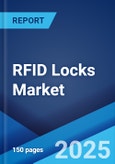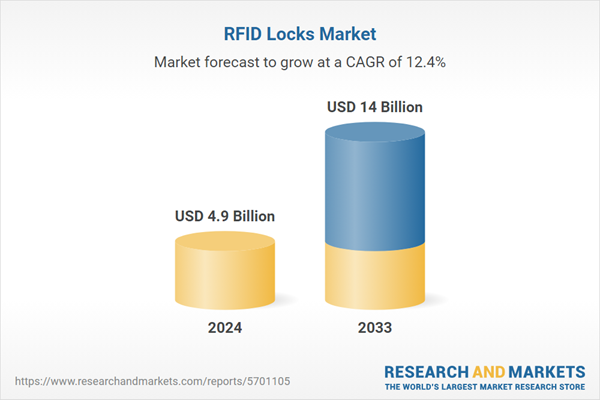RFID Locks Market Analysis:
- Major Market Drivers: The rising shift towards electromechanical devices over conventional locking systems is bolstering the market.
- Key Market Trends: Integration with biometric systems, the growing penetration of high-speed internet connectivity, and the development of multi-functional locks are key advancements stimulating the market growth.
- Competitive Landscape: Some of the prominent companies include Assa Abloy AB, Dormakaba Group, Euro-locks SA NV (Lowe & Fletcher Group), Godrej & Boyce Manufacturing Co. Ltd., Hanman International Pte. Ltd., Hettich Holding GmbH, MIWA Lock Company Ltd, Nestwell Technologies, Ojmar SA, Onity Inc., SALTO Systems S.L, Senseon, and Yale, among many others.
- Geographical Trends: North America dominates the market due to due to high adoption in commercial and residential sectors, technological advancements, a focus on security, and a strong demand for smart home solutions.
- Challenges and Opportunities: The vulnerability to hacking and unauthorized access is hampering the market growth. However, integrating advanced encryption technologies and regular software updates to enhance security will continue to strengthen the market growth.
RFID Locks Market Trends:
Growing Adoption of AI-Enhanced Security Products
AI-enhanced security products in the RFID locks reflect a demand for smarter, more responsive access solutions. AI integration improves lock performance by enabling predictive maintenance, enhancing security protocols, and providing real-time data analytics to prevent unauthorized access and provide strong protection. For example, in April 2024, Citisolutions introduced premium RFID hotel locks, "HiKlas," in India. These locks feature high-quality 304-grade stainless steel, advanced security technology, and elegant design. According to the RFID locks market analysis report, this is acting as a significant growth-inducing factor.Rising Demand for Sustainable Solutions
The increasing demand for battery-less and sustainable solutions in the market is driven by the need to reduce maintenance costs and environmental impact. Battery-less RFID locks offer energy efficiency and sustainability, eliminating the need for frequent battery replacements and minimizing electronic waste. For instance, in June 2024, Ojmar launched the OTS 20 battery-less, a self-powered RFID lock using push power technology. This innovation eliminates the need for batteries and maintenance, offering an eco-friendly, sustainable, and easy-to-install solution. This marks a significant advancement in the RFID locks market forecast report.Escalating Smart Security Technology Adoption
The growth in smart security technology adoption drives the market as businesses and consumers seek advanced solutions for secure access control. RFID locks offer convenience, flexibility, and enhanced security features, meeting the increasing demand for reliable and intelligent security systems in various applications. For example, in August 2024, Godrej unveiled IoT-based digital locks with advanced AI capabilities and enhanced data security. The new products aim to leverage big data and machine learning while addressing concerns over data privacy and clonability in RFID technology.Global RFID Locks Industry Segmentation:
The research provides an analysis of the key trends in each segment of the global RFID locks market report, along with forecasts at the global, regional and country levels from 2025-2033. Our report has categorized the market based on access device and end user.Breakup by Access Device:
- Key Cards
- Mobile Phone
- Wearable.
Key cards dominate the RFID locks market share
The report has provided a detailed breakup and analysis of the market based on the access device. This includes key cards, mobile phone, and wearables. According to the report, key cards represented the largest market segmentation.Key cards dominate the market, owing to their convenience and cost-effectiveness. Hotels use key cards to provide guests with easy room access, enhancing security while reducing operational costs. For example, Assa Abloy offers RFID-based key cards used in their electronic locks for hotels.
Breakup by End User:
- Residential
- Hospitality
- Automotive
- Government
- Retail
- BFSI
- Other.
Residential dominates the RFID locks market
The report has provided a detailed breakup and analysis of the market based on the end user. This includes residential, hospitality, automotive, government, retail, BFSI, and others. According to the report, residential represented the largest market segmentation.The residential sector dominates the RFID locks market demand due to rising smart home adoption. For example, homeowners increasingly prefer RFID locks for enhanced security and convenience, allowing keyless entry through smartphones or RFID cards.
Breakup by Region:
- North America
- United States
- Canada
- Asia-Pacific
- China
- Japan
- India
- South Korea
- Australia
- Indonesia
- Others
- Europe
- Germany
- France
- United Kingdom
- Italy
- Spain
- Russia
- Others
- Latin America
- Brazil
- Mexico
- Others
- Middle East and Afric.
North America dominates the RFID locks market outlook
The report has also provided a comprehensive analysis of all the major regional markets, which include North America (the United States and Canada); Asia Pacific (China, Japan, India, South Korea, Australia, Indonesia, and others); Europe (Germany, France, the United Kingdom, Italy, Spain, Russia and others); Latin America (Brazil, Mexico, and others); and the Middle East and Africa. According to the report, North America accounted for the largest market share.According to the RFID locks market outlook report, North America's dominance in the RFID locks market is driven by the region's emphasis on security and technological advancements. The growing adoption of smart security solutions in residential and commercial sectors fuels this demand. For example, in the hospitality industry, hotels across the United States increasingly use RFID locks to enhance guest experience and security. For instance, Dormakaba is a key player, providing RFID lock solutions like the Saflok Quantum series, favored in both commercial and hospitality sectors.
Competitive Landscape:
The RFID locks market research report has provided a comprehensive analysis of the competitive landscape. Detailed profiles of all major market companies have also been provided. Some of the key players in the market include:- Assa Abloy AB
- Dormakaba Group
- Euro-locks SA NV (Lowe & Fletcher Group)
- Godrej & Boyce Manufacturing Co. Ltd.
- Hanman International Pte. Ltd.
- Hettich Holding GmbH
- MIWA Lock Company Ltd
- Nestwell Technologies
- Ojmar SA
- Onity Inc.
- SALTO Systems S.L
- Senseon
- Yal.
Key Questions Answered in This Report
- What was the size of the global RFID locks market in 2024?
- What is the expected growth rate of the global RFID locks market during 2025-2033?
- What are the key factors driving the global RFID locks market?
- What has been the impact of COVID-19 on the global RFID locks market?
- What is the breakup of the global RFID locks market based on the access device?
- What is the breakup of the global RFID locks market based on the end user?
- What are the key regions in the global RFID locks market?
- Who are the key players/companies in the global RFID locks market?
Table of Contents
Companies Mentioned
- Assa Abloy AB
- Dormakaba Group
- Euro-locks SA NV (Lowe & Fletcher Group)
- Godrej & Boyce Manufacturing Co. Ltd.
- Hanman International Pte. Ltd.
- Hettich Holding GmbH
- MIWA Lock Company Ltd
- Nestwell Technologies
- Ojmar SA
- Onity Inc.
- SALTO Systems S.L
- Senseon
- Yale
Table Information
| Report Attribute | Details |
|---|---|
| No. of Pages | 150 |
| Published | June 2025 |
| Forecast Period | 2024 - 2033 |
| Estimated Market Value ( USD | $ 4.9 Billion |
| Forecasted Market Value ( USD | $ 14 Billion |
| Compound Annual Growth Rate | 12.4% |
| Regions Covered | Global |
| No. of Companies Mentioned | 13 |









